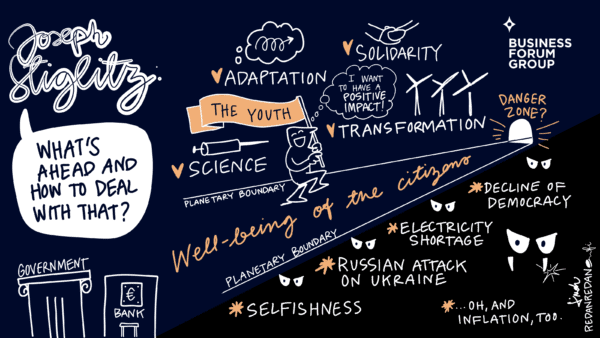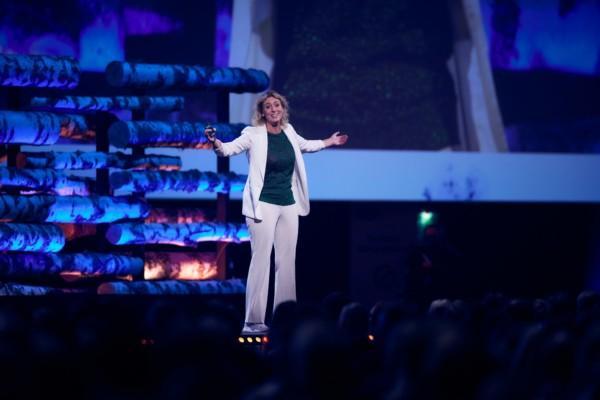21Sep2022
With a whole day of inspirational keynotes, productive networking, and afterwork socializing behind us, thousands of business leaders convened once more at the Nordic Business Forum to take in a series of powerful messages delivered by a stellar lineup of keynotes about the state of the world we live in today.
The key takeaways from an eye-opening day 2 have been distilled and shared below.
Gary Kasparov – A Rallying Call to Stand Strong against Evil
“You can’t negotiate with cancer. All you can do is cut it out.”
Those of us fortunate to be present at the start of day 2 of the conference witnessed surprise speaker Gary Kasparov’s ruthlessly logical breakdown of how Russian business and politics are inextricably entangled with Putin’s expansionist aspirations.
From “the self-perceived tragedy that was the Soviet collapse” to Georgian and Crimean military actions, Kasparov meticulously walked the audience through the decades of policies, aggressions, and preparations that led Ukraine to suffer the worst atrocities seen on this continent since the Second World War.
And, in an age where “words are cheap, look at the numbers.” According to Kasparov, Russia has made trillions of dollars selling energy to the world. In return, Russia has spent the past decade building a police state, the world’s most powerful lobbyist machine, an army of troll farms and fake news media, and a stockpile of gold to help when the inevitable sanctions.
But, there is hope. In his closing words, Kasparov urged the free world to stand united with Ukraine and see out the winter, as Russia’s already strained economy is close to collapse. To do so is to stand against evil. To buckle is to send a worrying message to Venezuela, to Taiwan, and to other freedom fighters around the world.
Martin Lindstrom – Branding in the Metaverse
What links brands, the Metaverse, and its impact on human potential? According to Lindstrom, the answer is the taste of milk. His keynote kicked off with bucolic images of a herd of cows roaming over lush pastures. As the camera pulled back, the audience saw that these were, in fact factory-farmed cows wearing headsets screening images of those green fields. Why? Because they produced better quality milk.
Aside from the Metaverse of billions, Lindstrom also believes we should be deeply concerned about the ethical, psychological, and social implications of the Metaverse of One. Our own personally tailored pasture, owned by corporations. “If I’m broke, will I lose access? Will my memories be wiped away?”
This is where brands will play a critical role. Instead of leveraging our brains to squeeze out profit, brands need to establish a deeply-considered code of ethics that will enable them to positively impact the world in which the next generation will live out a large part of their lives.
Lindstrom concluded by showing the path forward. By distilling a brand’s message to a single word, companies like Red Bull could create virtual drinks that give people a measurable energy boost. If each brand strives to create uplifting virtual experiences that harness this metacebo effect, our potential will be unlocked, and our society will benefit.
So, is the Metaverse juice worth the squeeze?
Yuval Noah Harari – Our Future Lives in the Eye of the Storm
“The real problem is not jobs disappearing. It’s if we can adapt along with the job market.”
According to Harari, the pace of change seen in the world over the next 30 years will resemble the continuous, increased acceleration of an electric car. No plateaus, no time to pause. By the time we’ve gained our bearings, the world we know will recede into the distance.
“Can a 40-year-old truck driver reinvent himself as a yoga teacher? And then again, as the job market continues to evolve?” If, as Harari postulated, we need to prepare our minds, societies, and governments for an era of continual readjustment as technologies keep redesigning the world of work, then it is essential we understand the kinds of skills people need to navigate this shifting terrain.
The key, according to Harari, is consciousness. Unlike any impending super-intelligent AIs that are supreme problem solvers, humans will always excel at building relationships with others based on feelings.
The ability to quickly unlearn and acquire a new understanding of societal terrain will also be key. Finally, Harai concluded, “our best bet is to explore and develop the potential we already have. For every dollar spent developing AI, we should also spend a dollar finding ways to tap the extent of our own abilities.”
Do you agree with Harari’s view of the future? Will we live in constant change, or will some things endure?
Zoe Chance – Influence, Fast and Slow
It turns out our brains contain an alligator and a judge. As Chance shared with an attentive day 2 afternoon audience, the gator represents system 1 thinking or the “emotional, automated, visual system that drives 80% of our actions.”
The judge, however, is slow, considered, and easily biased by the emotions and feelings experienced by system 1. This is why our normal mode of influence, namely appealing to our sense of reason and logic with data, facts, and arguments, is way less efficient than tickling that gator’s belly.
The gator is also always the “first responder,” our first, knee jerk, impulsive reaction. Therefore, it makes sense for brands to talk to the gator before trying to convince the judge with any closing arguments.
Finally, a gator is lazy above all things. It will take the path of least resistance, even if that means doing nothing. That’s why opt-out organ donor policies are way more effective than opt-in ones. This plays out in Customer Effort Scores, that answer one question – how much effort did it take? – and are more predictive of spend and loyalty than any other metric.
Chance wrapped up by asking the audience to think about how their businesses can make it easier for gators to take that easy, next baby step. To build a path of least resistance towards becoming a customer.
Duncan Wardle – Do Business with Your Inner Child
“Diversity is innovation. If someone doesn’t look like you, they don’t think like you. And they can help you think differently.”
Despite everyone in the conference hall being born a child, Duncan Wardle was once again shocked by how few attendees raised their hands when asked if they were creative people. Education and adult worklife are partly to blame – years spent coloring between the lines.
But, when our “river of thinking” leaves us in danger of missing new ideas that could mean profit or survival, we are often too slow to swim. Thankfully, Walt Disney himself developed a tool to help us break free of the currents of conformity.
As Wardle demonstrated, the method is easy. Simply list the rules of your industry without thinking. If you were a movie rental business in 2006, you’d have your store, your late fees, your opening hours. Then, break these rules by asking “what if.” With no stores, no physical movies, no late fees, and no opening hours, you end up with Netflix.
You might be able to see how to break the rules. But, it won’t hurt to bring in a naive expert, someone who isn’t afraid to ask the silly, tough question that might reveal an entirely new way of thinking about your business. After all, as Wardle concluded, “if no freshness goes into your creative thinking, then no freshness can come out.”
Are you caught in a river of thought? Do you need a naive expert to fish you out?
Joseph Stiglitz – Combating the Global Attack on Democracy
“Raising interest rates will not produce more oil. It can result in unnecessary recession.”
The conference closed out a stacked roster of day 2 keynotes with Stiglitz’ concerned appraisal of the current state of the global economy, during which he also turned a hopeful eye to the future. However, he also admitted that many western nations have behaved selfishly, with the consequences of vaccine hording and vaccine apartheid contributing to the breakdown in global solidarity we now see in the face of Russia’s war on Ukraine.
Stiglitz also implored the leaders of Europe to understand that the continent is in the middle of a war between democracy and authoritarianism. Peacetime economic measures such as deregulated energy markets and the absence of windfall taxes cannot function under wartime conditions, and policy needs to change.
In closing, Stiglitz singled out the enlightenment ideals and functional democracies of the Nordic states as an example the world can follow to combat this crisis. As Stiglitz noted, “The American dream is a myth. The Nordic dream is much closer to reality. But it requires constant work to maintain.”
That work has already started, with several European states announcing energy price caps which, along with other fiscal measures, will begin to decrease inflation. The choices made by leaders today will impact the world we hand over to the generation of tomorrow. “Let’s try not to wreck it before we do,” Stiglitz concluded.
Want to get the leadership learnings from Nordic Business Forum 2022 Day 1 as well? Dive into them here!


